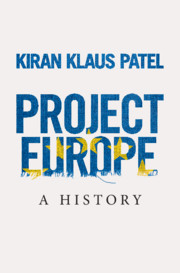Book contents
- Project Europe
- Project Europe
- Copyright page
- Contents
- Figures, Maps and Tables
- Abbreviations
- Frontispiece
- Prologue
- 1 Europe and European Integration
- 2 Peace and Security
- 3 Growth and Prosperity
- 4 Participation and Technocracy
- 5 Values and Norms
- 6 Superstate or Tool of Nations?
- 7 Disintegration and Dysfunctionality
- 8 The Community and Its World
- Epilogue
- Acknowledgements
- Notes
- Bibliography
- Index
6 - Superstate or Tool of Nations?
Published online by Cambridge University Press: 24 April 2020
- Project Europe
- Project Europe
- Copyright page
- Contents
- Figures, Maps and Tables
- Abbreviations
- Frontispiece
- Prologue
- 1 Europe and European Integration
- 2 Peace and Security
- 3 Growth and Prosperity
- 4 Participation and Technocracy
- 5 Values and Norms
- 6 Superstate or Tool of Nations?
- 7 Disintegration and Dysfunctionality
- 8 The Community and Its World
- Epilogue
- Acknowledgements
- Notes
- Bibliography
- Index
Summary
Brussels has often been criticised as a bureaucratic monster, a supranational juggernaut, a new empire. While the terms leave much room for interpretation, they all present the EC as a threat to the political order of its member states. In reality, member states have been central to the integration process throughout its history. That is not to suggest that Brussels simply represented an extension of their interests. It is true to an extent, yet in the course of time the integration process also fundamentally transformed the member states. But there was no need for a gigantic Brussels bureaucracy to subjugate or substitute the member states. The mechanisms involved, as this chapter shows, were much more subtle. While great change occurred at the political, administrative and legal levels, it appeared to make little difference to the everyday lives of ordinary people – who in turn showed little interest in these processes. And by the time the effects finally became more obvious the basic foundations had already been laid, making it difficult to ‘turn the clock back’.
- Type
- Chapter
- Information
- Project EuropeA History, pp. 176 - 208Publisher: Cambridge University PressPrint publication year: 2020

